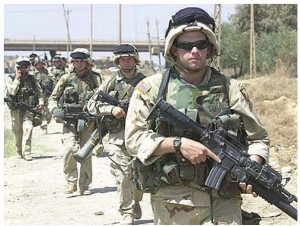Apr
23
Dog—–God
Filed Under Combat PTSD, Dogs, Pets, Tears of a Warrior, Treating PTSD | Comments Off on Dog—–God
by Janet J. Seahorn

Look into the face of your loving four-legged pet, and I would bet you would see the eyes of GOD. A being so unconditionally loving and faithful, that nothing or no one could keep it from being near our sides. We have written several times about the value of pets. For someone living with Posttraumatic Stress or a serious Traumatic Brain Injury, pets can offer a sense of comfort and well-being that are beyond modern medications; and the side effects are far more positive.
We get many comments and videos from our readers testifying to the upbeat effects their pets have had on them. This week a friend sent us a one we had not seen before. We thought many of you would enjoy viewing this short and touching piece. We also included another written story that has appeared over the internet on many occasions. More than likely, most of you have read it, but every time I see it, and am tempted to delete without reading… something pulls me to the picture and I begin viewing it once more, ending always with tear filled Kleenexes.
You see, this last piece is a true chronicle of what many of our service people and their loving pets sacrifice for our country. Not everyone understands that pets pay a high price for their masters’ deployment. Yet, they do, silently, patiently waiting for that one special person to return. There is no greater joy than the homecoming of a beloved member of a family.
So here is to DOG and to GOD: D = Devotion; O = Omnipresent; G = Goodness/Gift; in any order it means the same thing.
Apr
14
Here Today and Sometimes Still Here Tomorrow
Filed Under Combat PTSD, PTSD, Tears of a Warrior, Today's War, War | 1 Comment

PTSD continues to be everywhere in the news, on TV, and in the movies. The question I have is “Who is listening to all of these stories? Who is concerned about the growing number of new cases resulting from multiple tours of duty in our current wars? Are those in Washington who must attend to severe budget concerns able to do what is necessary? What is right? Is the average American informed enough to care?” Following is information from just one of many data sources on PTSD. It comes from Noel Brinkerhoff (Monday, April 12, 2010), and the information is disturbing.
Nearly 300,000 American troops have served three, four or more times in Iraq and/or Afghanistan, while cases of post-traumatic stress disorder (PTSD) have risen dramatically since the wars began. The possible correlation between these two facts has led to the question of whether it’s fair to send young men and women back into combat again and again, and risk causing long-term mental and emotional problems, not to mention the physical toll.
One U.S. Army study from 2009 found troops in Afghanistan were more vulnerable to developing psychological problems as the number of tours went up (31% for three tours, more than double the rate of those with just one). Another study focused on Iraq showed nearly 15% of Army troops who served two tours suffered from depression, anxiety or traumatic stress; more than double that of a single tour. The PTSD rate was almost 2.5 times higher for two deployments compared with one.
“We just don’t know whether it’s combat exposure, repeated separation from the family or (not enough) time off,” Lieutenant Colonel Paul Bliese, director of the division of psychiatry and neuroscience at the Walter Reed Army Institute of Research, told the Associated Press. “All of those are reasonable explanations.”
Whatever the reason, the ultimate result is that more troops returning home are bringing back with them a whole host of demons and ghosts. These unwanted visitors may never leave the veteran and have significant impact on families, children, and communities. Let us hope that people who can make war decisions are listening, creating effective support services, and making the process as uncomplicated as possible. Let us hope that Americans are willing to provide the physical and mental health funding needed to restore those suffering from combat wounds.
For many families and veterans, the process of getting help becomes so overwhelming difficult that they feel victimized by the very system that should be offering them hope and healing. And let us hope that every politician and every member of our society takes seriously our motto:
If we send them, then we must mend them.
Apr
6
Happy Easter
Filed Under Combat PTSD, Easter, Family, PTSD, Tears of a Warrior | Comments Off on Happy Easter

In our family, Easter is a time to gather and celebrate the Good News. Our last blog focused on the challenges often associated with holidays along with some suggestions for making the day less stressful.
We are happy to report that our Easter celebration was wonderful. We had our sons, several of their friends, Jan’s sister, and two extra dogs for the afternoon. At times it could have been a bit hectic, however by following some of our own suggestions the day went quite well.
As the day went on, Tony made his choices based on how he was feeling and what he wanted to do at the time. Since there were a few basketball games on TV as well as a good movie, he had some quiet time in our lower family room. Most of the guests remained upstairs where goodies were arranged for munching and chatting.
Since the weather was warm with plenty of sunshine, after dinner everyone took a long walk, working off some calories and getting the four-legged visitors out for some exercise. Just being outside in the open air was very therapeutic. It is amazing how calming nature can be in normalizing an otherwise busy gathering.
The evening ended with playing our traditional family games which can be quite loud and annoying for some. So Tony once again spent some quiet time reading and watching March Madness.
What is important is that everyone had a good time, had plentiful opportunities to engage in a variety of activities, and made choices that were appropriate for each person. Long ago we stopped apologizing for any person who decides to make an alternative choice for the day. Each person is responsible for him/herself and each person has permission to do what is best for him/her anytime during the celebrations. By reducing unnecessary expectations, the large gatherings go much smoother.
We are so blessed to be able to spend quality time with family and friends. It is important, therefore, that these special occasions turn out to be special because of the good things that occur, instead of some outburst that will be remembered miserably.
Congratulations family! We made it perfectly through another holiday.
Apr
1
Hippity, Hoppity and Snotty Vets
Filed Under Combat PTSD, Easter, Events, PTSD, Tears of a Warrior | Comments Off on Hippity, Hoppity and Snotty Vets
-by Janet J. Seahorn

Gosh, can you believe it is Easter/Passover and once again families gather to celebrate the spirit of the season. Many will also hunt Easter eggs, gorge on chocolate bunnies, and enjoy family dinner and getting together. This is a time to rejoice, but can also be a time of turmoil. There is ample opportunity for our Snotty Vets to practice breathing, self-control, and “looking” cheerful – even if it’s only a facade. Today I woke with the children’s rhyme of “Here Comes Peter Cotton Tale”, but instead of the regular words this is what came to mind:
Here comes Peter Cotton Tail
Hopping down the combat trail,
Hippity, Hoppity, Demons on the way.
Yikes! How weird is that! Yet, the reality is many people who have suffered severe trauma find holidays incredibly challenging. When everyone around appears to be laughing, enjoying company, having a great time, for some with experiences of trauma, all this joy may simply exacerbate the feeling of depression and isolation. You desperately want to join in the festivities and you desperately want to feel normal. So the downward spiral continues.
Last blog I wrote about Snotty Fish and Snotty Vets. In reflection I remembered past family gatherings where my Snotty Vet tried anxiously to fit into the interactions. He participated gallantly until it got to be too much, which is when the teapot began to spout. Too much steam building in a confined container and something has to give. If only we had known about PTSD, its effects and ways of coping, family gatherings could have been much saner and safer for everyone.
Therefore, here are a few suggestions that have worked for us. We discovered these over many years of observing roller-coaster emotions.
- Don’t try and force your Snotty Vet to participate more than he/she is able.
- Allow them to swim in whatever pond helps them to feel safe and calm.
- Plan the loud festivities that can be annoying for many – not just Snotty Vets – to be in places that are outside or in very large surroundings. By being smart, it reduces the tension and permits everyone a chance to find areas that aren’t so irritating.
- Be thoughtful about the length of time anyone has to spend taking part in the activities.
- Be sure to find a good balance in how you celebrate. Be reflective and enjoy some quiet time as well.
Oh, and be sure to have a Happy Easter/Passover. Celebrations are still important to cherish. They can be the occasions that help us bond more tightly and even heal a bit.
And be sure to be kind to bunnies that wear combat boots.

